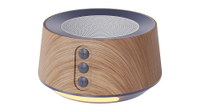These include proven stress relief exercises, and ensuring that you are prioritizing your slumber as well as you can. They don’t have to be arduous exercises either - you might find that listening to soothing music or a calming bedtime story for adults (opens in new tab) gives you relief. But for those who need something more robust, we reached out to Preventative Cardiology Specialist and Occupational Therapist Pranita Salunke, author of Vitality: A Healthy and Happy Heart (opens in new tab), for her go-to tips on how to reduce stress so that you are in a better frame of mind for easier, more peaceful sleep.
The relationship between stress and sleep
Before we get to those, here’s a question: What happens to us when we are dealing with prolonged stress, and how does it affect our sleep? “When we experience continuous levels of stress it keeps our sympathetic system active. This triggers the in-built ‘fight-or-flight’ response, which provides your body with a burst of energy so that it can respond to perceived dangers,” explains Salunke. “When you are in this state, you are unable to activate the parasympathetic nervous system, the body’s ’rest and digest’ response that helps to calm the body down after the danger has passed.” And this is crucial, because the parasympathetic system is associated with helping you to enjoy restorative sleep. So, if left unchecked, over time stress can become an issue for your sleep. We’re not talking about the odd bad night’s sleep either, but long-term sleep issues. As we discussed in our feature asking why is sleep important, a lack of consistent, good quality shut-eye can lead to weight gain, obesity and many metabolic conditions. So, how do you shift your body from sympathetic to the parasympathetic system when you’re feeling utterly stressed out? Salunke suggests the following…
Stress and sleep exercise 1: Keep a sleep diary
“One of the important first steps to solving your sleep problems is having awareness of what the problem actually is.” Salunke advises. “Start a sleep diary to note your sleep patterns. Are you struggling to fall asleep, or are you repeatedly waking through the night? Do you find it difficult to get back to sleep, perhaps? “Once you have a better understanding of your sleep patterns, you can start to work out the things that could be impacting your sleep positively or negatively. It could be what you’re eating, when you’re exercising, or your bedtime routine. Awareness puts you in a stronger position to make positive changes.” Bedtime routines are an important aspect of sleep hygiene (opens in new tab), and as such they can have a big impact on your quality of slumber. If what you’re sleeping on isn’t up to scratch, take a look at our guides to the best mattress online (opens in new tab) and the most supportive, comfy pillows for sleeping (opens in new tab).
Stress and sleep exercise 2: Journal your worries
Stream-of-consciousness writing is a great way to empty a busy mind before sleep, so there’s less chance of your thoughts following you into the bedroom. Here’s what Salunke suggests: “Take a bit of time to write down any ideas, thoughts or worries from your stream of consciousness. “Write free hand to express any anger, frustration, worry or sadness, and keep writing until you feel the cathartic effects. Once you empty your thoughts onto paper, you will notice the difference in the clarity of your mind.” Unsure what to write? Think about the things that are worrying you and purge them before you hit the bedroom. “If they really are problems, try writing three actions you can take in the coming days that will help you deal with the issue and overcome your worry. Having a plan and a clear timeline will help put your brain to rest.”
Stress and sleep exercise 3: Move a little
Regardless of which doctor or sleep expert you ask, most will advocate gentle movement before bed, rather than a pounding 20-minute H.I.I.T. session. That’s because your focus should be on relaxing, not sweating. “Some people will exercise before bed to burn off excess energy, but it is much more helpful to focus on relaxing movements,” Salunke agrees. “Yogic poses, such as the child pose, enhance blood supply to your brain, calm your mind and prepare your body for sleep. Intense exercise has a similar effect to watching emotionally moving movies or shows before bed.” You can find many yoga for sleep classes for free online (we love Yoga with Adriene), or you could try a free trial of Gaia, one of the best online fitness programs (opens in new tab) for all types of yoga.
Stress and sleep exercise 4: Meditate to relax
A number of scientific studies have supported the idea that the regular practice of meditation can be effective to manage stress. Why? Because meditation reduces the production of stress hormones including cortisol and adrenaline. “Some people find it difficult to start meditating, but to reap the real rewards, consistency is the key,” says Salunke, “so make it a regular habit in your routine. As a simple meditation exercise to get started, you could try some Breath Awareness Meditation.” Here’s how to do it:
Sit in a quiet place, wearing comfortable clothes, with soothing lights, away from the outside world’s distraction and noise, either in a chair or on a mat on the floor, wherever you feel comfortable.With eyes closed, relax your body and bring your attention to your breath. As you observe the breath, you will notice it will slow down automatically. Keep observing your breath; if your mind wanders for a few moments, slowly bring it back to your breathing.
Gradually, you will notice your thoughts are fading away like clouds passing in a clear blue sky. Clearing clouds of thoughts clears your consciousness and helps move you into a positive state of being and restful awareness. “Remember, stress and sleep are interconnected. We may not have control over the external stressful situations, but focusing on that is wasteful.” Instead, Salunke recommends that you, “channel your energy into how you can improve both the quality and quantity of your sleep, so that you can manage your stress levels and improve your health.”
Three products to help you de-stress and sleep
Looking to upgrade your mattress? Save on sleep with our roundups of this month’s best Saatva mattress discounts (opens in new tab), and the latest Purple mattress deals (opens in new tab).


